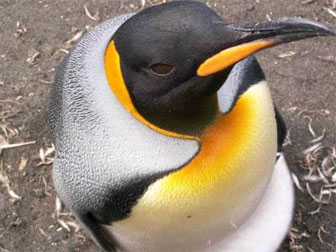Can penguins be used as bio-indicators of climate change?
Can penguins be used as bio-indicators of climate change?
mongabay.com
April 4, 2007
Scientists at the University of Birmingham are working to determine whether the king penguin can be used as a bio-indicator for global warming.
“If penguins are travelling further or diving deeper for food, that tells us something about the availability of particular fish in regions of the Antarctic. We may be able to assess the pressure exerted by king penguins on this ecosystem, and look at the effects of both climate change and overfishing in this region of the world”, said Dr Lewis Halsey of the The University of Birmingham who presented his research at the Society for Experimental Biology’s Annual Meeting in Glasgow.
Measuring the energy requirements of animals is one way to use them as bio-indicators said Halsey, who along with colleagues, “measured the heart rate and energy expenditure of king penguins” during various activities to see “if there was a correlation between the energetic costs of foraging at sea and the levels of fish available to the penguins i.e. did penguins have to work harder when food was scarce.”
 King penguin. Photo by Lewis Halsey |
“King penguins are good candidates as bio-indicators for several reasons,” explained a statement from the Society for Experimental Biology. “Firstly, while at sea foraging, they cover hundreds of kilometres and are able to dive to depths of several hundred metres, so they explore a relatively large portion of the expansive Southern Oceans. Secondly, the diets of several populations of king penguins are well known. Thirdly, while foraging for food is done at sea the penguins also come ashore to breed and moult, making them accessible to researchers.”
Related articles
African penguin population drops 40% – cause unknown March 2, 2007
African penguin populations have fallen by 40 percent in the past few years according to an article published in the March 2, 2006 issue of Science. Biologists are puzzled by the decline. Rob Crawford, a penguin expert with South Africa’s Environmental Affairs Department, is quoted as saying the trend is “quite disturbing.” He believes the drop may be due to scarcity of sardines and anchovies around penguin colonies, a development that may be the result of over fishing or larger environmental changes. The article notes that the South African government is evaluating various measures to protect penguins including “establishing no-fishing zones around several breeding islands.”
Antarctic Peninsula warming affects penguins, krill February 15, 2007
While much of Antarctica has cooled over the past decade, a warming trend in the Antarctic Peninsula may indicate what the future holds for the rest of the icy continent’s wildlife. Researchers at Ohio State University say that higher temperatures have already forced penguin populations to migrate south and may have reduced the availability of krill that serve as the based of the Antarctic food chain.
This article is based on a news release from the Society for Experimental Biology














